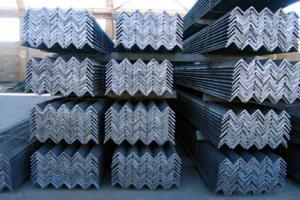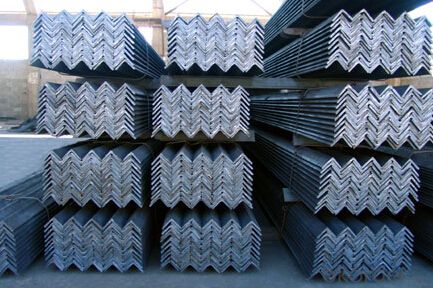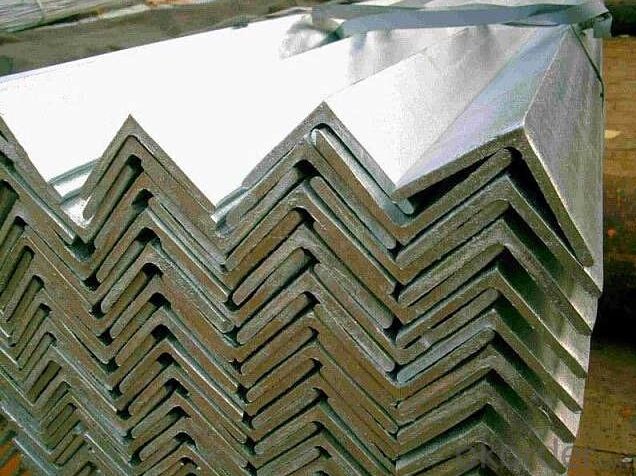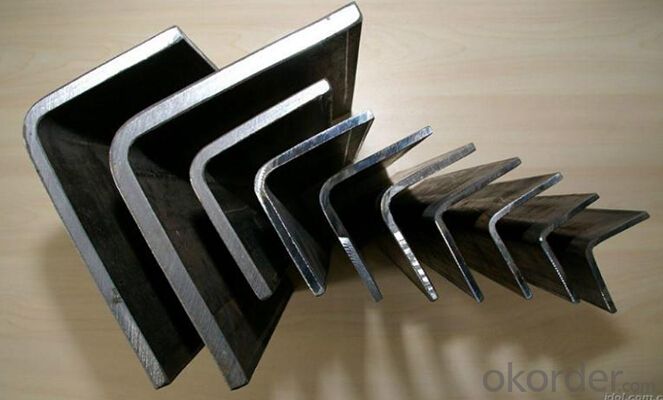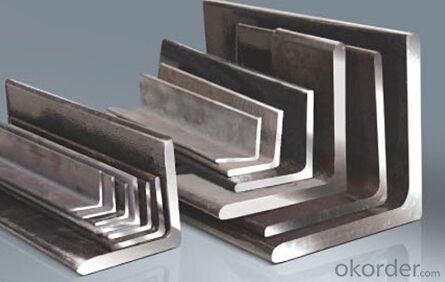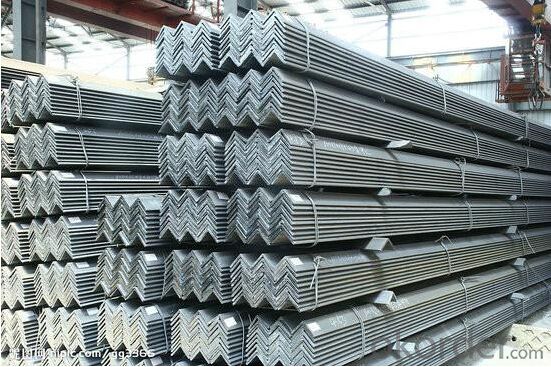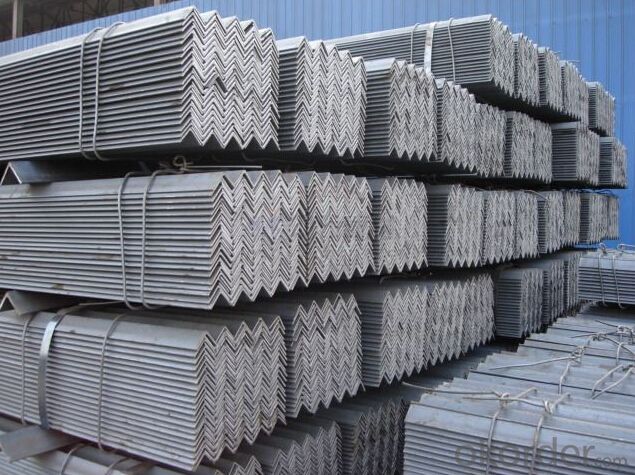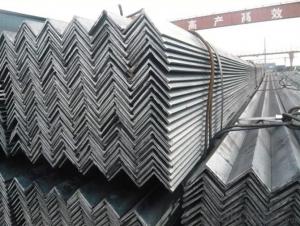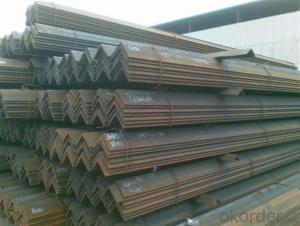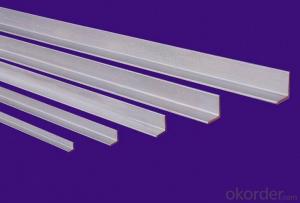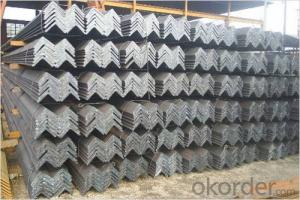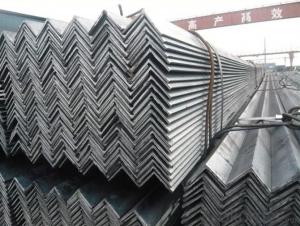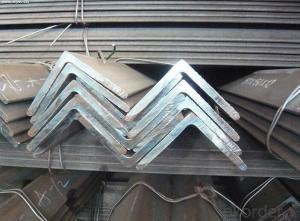Angle Bar _Steel Galvanized Angle Iron_Mild Steel Equal Angle
- Loading Port:
- Tianjin
- Payment Terms:
- TT OR LC
- Min Order Qty:
- 3 m.t.
- Supply Capability:
- 10000 m.t./month
OKorder Service Pledge
OKorder Financial Service
You Might Also Like
Specification
Detailed Informaion
Name | Equal/Unequal Angle Steel Bar |
Shape | Equal/Unequal Angle |
Standard | GB/ASTM/SAE/AISI/DIN/JIS/EN/BS |
Surface Treatment: | Black/Peeling/Polished/Machined |
Delivery Condition: | Hot Rolled or Forged/Peeled or Black Surface |
Test | SGS/UT 100% Elements Testing |
Certificate: | ISO/Mill Certificate |
Service: | 24 hours online service / |
more than 20 years trading and manufacture | |
Quality Assurance: | the third party inspection, such as SGS, BV, TUV…etc. is acceptable |
Packaging Details: | Seaworthy Packaging or as per customer's packing instruction |
Specification
hot rolled equal angle steel | hot rolled unequal steel angle |
specification(mm) | specification(mm) |
20*3/4 | 26*16*3/4 |
25*3/4 | 32*20*3/4 |
30*3/4 | 40*25*3/445*28*3/4 |
36*3/4/5 | 50*32*3/4 |
40*3/4/5 | 56*36*3/4/5 |
45*3/4/5/6 | 63*40*4/5/6/7 |
50*3/4/5/6 | 70*45*4/5/6/7 |
56*3/4/5/8 | 75*50*5/6/8/10 |
63*4/5/6/8/10 | 80*50*5/6/7/8 |
70*4/5/6/7/8 | 90*56*5/6/7/8/ |
75*5/6/7/8/10 | 100*63*6/7/8/10 |
80*5/6/7/8/10 | 100*80*6/7/8/10 |
90*6/7/8/10/12 | 110*70*6/7/8/10 |
100*6/7/8/10/12/14/16 | 125*80*7/8/10/12 |
110*7/8/10/12/14 | 140*90*8/10/12/14 |
125*8/10/12/14 | 160*100*10/12/14/16 |
140*10/12/14/16 | 180*110*10/12/14/16 |
160*10/12/14/16 | 200*125*12/14/16/18 |
180*12/14/16/18 |
|
200*14/16/18/20/24 |
|
Company Information
CNBM International Corporation is the most import and export platform of CNBM group(China National Building Material Group Corporation) ,which is a state-owned enterprise, ranked in 270th of Fortune Global 500 in 2015.
With its advantages, CNBM International are mainly concentrate on Cement, Glass, Iron and Steel, Ceramics industries and devotes herself for supplying high quality series of refractories as well as technical consultancies and logistics solution.
Packaging & Delivery
Packaging Detail | Sea worthy packing /as per customer's packing instruction |
Delivery Detail | 15 ~ 40 days after receiving the deposit |
Product Show
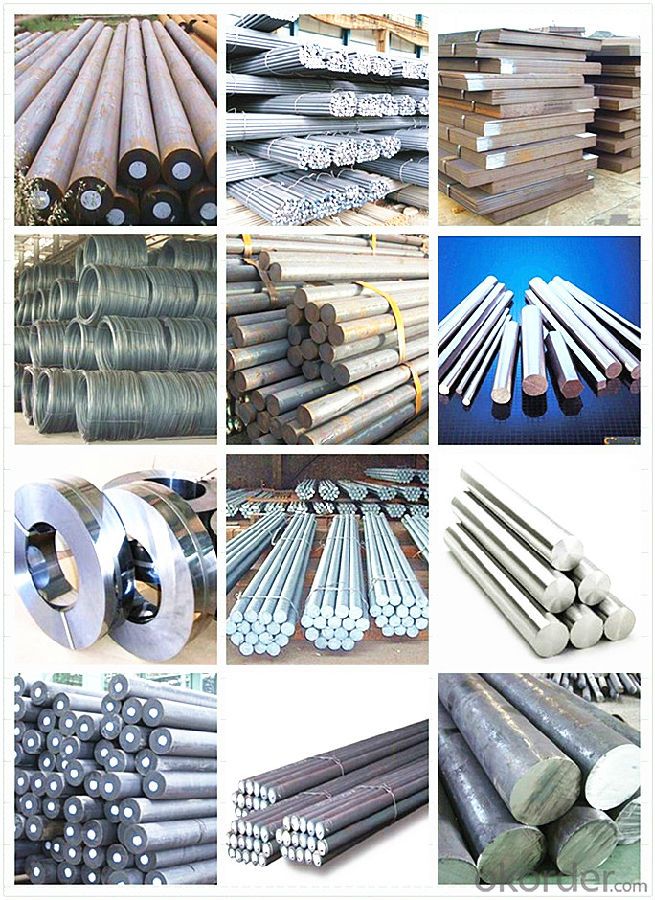
FAQ
Are you a trading company or manufacturer? | Manufacturer |
What’s the MOQ? | 3 metric ton |
What’s your delivery time? | 15-35 days after downpayment received |
Do you Accept OEM service? | Yes |
what’s your delivery terms? | FOB/CFR/CIF |
What's the Payment Terms? | 30% as deposit,70% before shipment by T/T |
Western Union acceptable for small amount. | |
L/C acceptable for large amount. | |
Scrow ,Paybal,Alipay are also ok | |
Why choose us? | Chose happens because of quality, then price, We can give you both. |
Additionally, we can also offer professional products inquiry, products knowledge train (for agents), smooth goods delivery, excellent customer solution proposals. | |
What's your available port of Shipment? | Main Port, China |
What’s your featured services? | Our service formula: good quality+ good price+ good service=customer's trust |
Where are your Market? | Covering more than 160 countries in the world |
- Q: What are the main applications of special steel in the power generation equipment?
- Special steel is widely used in power generation equipment due to its exceptional properties such as high strength, corrosion resistance, and heat resistance. It finds applications in various components of power generation equipment, including turbine blades, boiler tubes, heat exchangers, and pressure vessels. These components need to withstand extreme conditions such as high temperatures, pressures, and corrosive environments. Special steel ensures the durability and reliability of power generation equipment, ultimately enhancing the efficiency and performance of power plants.
- Q: Can special steel be used in the railway industry?
- Yes, special steel can be used in the railway industry. Special steel, such as high-strength steel or corrosion-resistant steel, can be utilized for various applications in the railway industry, including the construction of tracks, bridges, and locomotives. These types of steel offer enhanced durability, strength, and resistance to wear and tear, making them suitable for the demanding conditions and heavy loads encountered in the railway sector.
- Q: How does special steel perform in cryogenic applications?
- Special steel is renowned for its exceptional performance in cryogenic applications, characterized by extremely low temperatures that fall below -150 degrees Celsius (-238 degrees Fahrenheit). Unlike regular steel, which tends to become brittle and weaker in such conditions, special steel, also referred to as cryogenic steel or low-temperature steel, is specifically engineered to withstand these extreme cold temperatures. One of the key advantages of special steel lies in its ability to maintain its mechanical properties even at cryogenic temperatures. It retains its strength, toughness, and ductility, enabling it to endure the stresses and strains imposed on it in cryogenic environments. As a result, special steel finds application in various fields, including aerospace, energy, and healthcare, where it is used in cryogenic storage tanks, pipelines, and equipment. Another significant feature of special steel is its excellent resistance to brittle fracture at low temperatures. This is of utmost importance since brittle fractures occur when materials become excessively brittle and fail under stress. The distinct composition and processing methods employed in special steel help prevent such fractures, ensuring the integrity and safety of components within cryogenic systems. Furthermore, special steel possesses a low coefficient of thermal expansion, meaning it undergoes minimal dimensional changes when exposed to temperature fluctuations. This characteristic proves highly advantageous in cryogenic applications as it preserves the stability and reliability of equipment and structures. Additionally, special steel exhibits commendable corrosion resistance, which is vital in cryogenic environments where the presence of moisture and certain chemicals can accelerate corrosion processes. By resisting corrosion, special steel enhances the longevity and durability of components, thereby reducing maintenance and replacement costs. In conclusion, special steel is the preferred choice for cryogenic applications due to its ability to maintain mechanical properties, resist brittle fracture, display low thermal expansion, and exhibit corrosion resistance. These properties render it a dependable and efficient material for use in cryogenic systems, providing the necessary strength and durability even under extremely low-temperature conditions.
- Q: Can special steel be used in the semiconductor manufacturing industry?
- Yes, special steel can be used in the semiconductor manufacturing industry. Special steel alloys with high levels of purity and specific properties, such as high thermal conductivity and resistance to corrosion, can be utilized in various applications within semiconductor manufacturing, including the fabrication of specialized tools, equipment, and components.
- Q: What are the requirements for special steel used in industrial equipment manufacturing?
- The requirements for special steel used in industrial equipment manufacturing typically include high strength, durability, corrosion resistance, and the ability to withstand high temperatures and pressure. Additionally, the steel should have excellent machinability and weldability to facilitate the manufacturing process. These requirements ensure that the steel can withstand the demanding conditions and provide long-lasting performance in industrial equipment.
- Q: How does special steel withstand extreme temperatures?
- Special steel is designed to withstand extreme temperatures due to its unique composition and manufacturing process. It contains a higher percentage of alloying elements, such as chromium, nickel, and molybdenum, which enhance its heat resistance properties. These alloys form a protective layer on the surface of the steel, preventing oxidation and corrosion at high temperatures. Additionally, special steel undergoes specific heat treatment methods, such as quenching and tempering, which further enhance its ability to withstand extreme temperatures without losing its strength and structural integrity.
- Q: What are the specific requirements for special steel used in the oil and gas pipeline industry?
- The specific requirements for special steel used in the oil and gas pipeline industry include high strength, corrosion resistance, and toughness to withstand harsh operating conditions. The steel must also have excellent weldability and formability for ease of fabrication and installation. Additionally, it should have low sulfur and phosphorus content to prevent embrittlement and ensure long-term durability. Furthermore, the steel should possess high fracture toughness and resistance to hydrogen-induced cracking, as well as meet specific dimensional and mechanical property standards set by industry regulatory bodies.
- Q: What are the different methods of surface powder coating for special steel?
- Special steel can be coated using various surface powder coating methods. These methods include: 1. Electrostatic powder coating: By charging the powder particles and spraying them onto the steel surface, a uniform and durable coating is achieved. The charged particles are attracted to the grounded steel. 2. Fluidized bed powder coating: Preheating the steel and dipping it into a fluidized bed of powder particles results in a smooth coating. The heat causes the powder to melt and adhere to the steel surface. Excess powder is removed through shaking or blowing air. 3. Flame spray powder coating: This method involves heating the powder particles with a flame and then spraying them onto the steel surface. The melted powder solidifies to form a coating. This method is commonly used for repairing damaged coatings or larger steel structures. 4. Thermal spray powder coating: By heating and propelling the powder particles onto the steel surface using a thermal spray gun, a dense and well-adhered coating is achieved. This method is suitable for high-wear applications and corrosive environments. 5. UV-cured powder coating: Applying a UV-sensitive powder onto the steel surface and exposing it to UV light initiates a chemical reaction that results in a hard coating. UV-cured powder coating is known for its fast curing time and excellent resistance to chemicals and UV radiation. Each method has its own advantages and considerations, and the choice depends on factors such as the specific requirements of the steel surface, desired coating thickness, and production volume.
- Q: What is the difference between stainless steel and special steel?
- Stainless steel is a type of steel that contains a high amount of chromium, which makes it resistant to corrosion and staining. On the other hand, special steel refers to a wide range of alloys that are specifically designed to have unique properties, such as high strength, heat resistance, or electrical conductivity. While stainless steel is primarily used for its corrosion resistance, special steel is tailored to meet specific requirements in various industries, such as aerospace, automotive, or construction.
- Q: What are the main advantages of using special steel in the construction of bridges?
- The main advantages of using special steel in the construction of bridges are its high strength, durability, and resistance to corrosion. Special steel, such as high-strength low-alloy steel or weathering steel, can withstand heavy loads and extreme weather conditions, making it ideal for bridge construction. Its superior strength allows for the design of lighter and more cost-effective structures. Additionally, special steel's resistance to corrosion reduces maintenance and repair costs, ensuring the longevity and safety of the bridge.
Send your message to us
Angle Bar _Steel Galvanized Angle Iron_Mild Steel Equal Angle
- Loading Port:
- Tianjin
- Payment Terms:
- TT OR LC
- Min Order Qty:
- 3 m.t.
- Supply Capability:
- 10000 m.t./month
OKorder Service Pledge
OKorder Financial Service
Similar products
Hot products
Hot Searches
Related keywords
